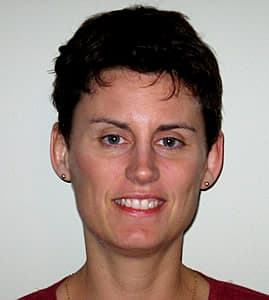
Mathematics research by one Cato College of Education professor is among scientific findings from 2017 with the potential to change world, according to publishing giant Springer Nature.
Associate professor Michelle Stephan co-authored the paper “What Mathematics Education May Prepare Students for the Society of the Future,” which was recognized by Springer’s Change the World, One Article at a Time initiative.
The research offers a discussion on the math instruction students need to engage in a society evolving in response to technology and digitalization.
“The motivation for our exploration is in the observation that the role of mathematics in our society is not only growing, but that mathematics is also increasingly done by machines. This will have an impact on both future job requirements and on the mathematics one will need to understand one’s world,” the authors wrote.
To identify articles for the Change the World initiative, Springer Nature asked editors-in-chief of its journals across disciplines to select the scientific findings published in 2017 that they believe could have an impact on society's most pressing problems. Articles cover subjects like education, chemistry, engineering, medicine and psychology.
According to Stephan and her co-authors, math has a growing role to play in an increasingly digitized society in part because it is integral what computers do.
“At the same time, the omnipresent mathematics is mainly hidden in all sorts of apparatus, which function as black boxes for its users. This leads to the apparent paradox that, in spite of the central role of mathematics in our society, we do not see mathematics and only few people seem to do mathematics,” the paper argues.
This merits a shift away from teaching students skills that directly compete with what computers do best and toward those that complement those functions, particularly in the context of the modern workplace. Students should still know how to compute, but more emphasis should be placed on understanding concepts and solving realistic problems, Stephan said. She points to the example of an engineer offering a client solutions.
“They create several mathematical models given the constraints of the project (e.g., money, type of materials, etc.) and find the optimal solution to present the client. There are plenty of sophisticated software programs that will conduct the appropriate calculations, so that the engineers can focus on constructing the appropriate mathematical models.”
Stephan expressed concern over the reluctance to change mathematics curriculum in response to the evolving workforce needs and technological advancements, a concern she hopes the research can help address.
“Perhaps a paper like this can be a step in helping the community understand that the needs of our children are different today and that the goal of mathematics is not to be proficient at calculating but to be highly skilled at modeling and reasoning,” she stated.
Springer Nature is a leading academic and educational publisher serving the needs of researchers, students, teachers and professionals around the world. Each year, the company publishes around 300,000 research articles with 1 million corresponding authors across almost 3,000 journals and 13,000 books.